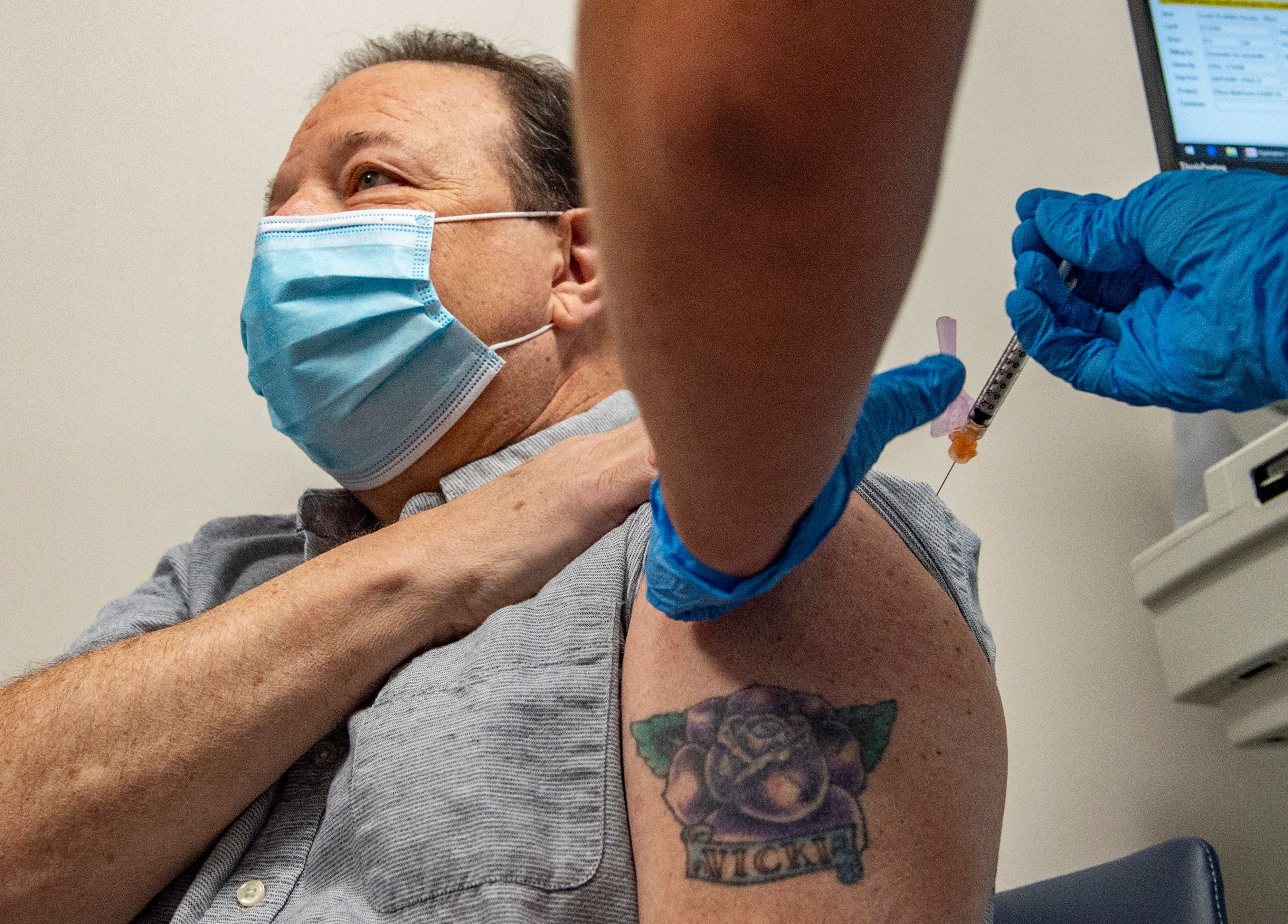
Six different Covid vaccines are safe and effective when used as boosters, UK study finds
Emergency Medical Technician Ethan Hall gives Mark Turney, 66, a kidney transplant patient, his Pfizer-BioNTech Covid-19 booster shot at Hartford Hospital in Hartford, Connecticut on August 24, 2021.
Joseph Prezioso | AFP | Getty Images
Six different Covid-19 vaccines are safe and effective when used as booster doses, a U.K. study has found.
The peer-reviewed phase 2 trial, published Thursday in The Lancet medical journal, looked at the safety and efficacy of seven vaccines given after two initial doses of either the Oxford-AstraZeneca or Pfizer-BioNTech vaccine.
Vaccines included in the study were those produced by Oxford-AstraZeneca, Pfizer-BioNTech, Novavax, Johnson & Johnson, Moderna, Valneva and Curevac.
The study, which involved 2,878 adults over the age of 30, found that none of the seven vaccines posed safety concerns. Fatigue, headaches, and pain at the injection site were the most common side effects, and were mostly reported in younger people.
A total of 912 participants experienced adverse events from their booster shot, with 24 severe events being reported during the study.
Participants were “in good health,” the study’s authors said and were recruited to take part from 18 different U.K. locations. Around half had received two doses of the Oxford-AstraZeneca vaccine, with the remaining cohort having been vaccinated with the Pfizer-BioNTech vaccine.
Around half of the study’s participants were over the age of 70. Some individuals were put into a control group and given a meningococcal vaccine as a placebo.
Varying immune response
Four weeks after the boosters were administered, researchers measured participants’ levels of antibodies that target the coronavirus’ spike protein.
The spike protein is a key part of the coronavirus’ structure that allows it to enter human cells.
T cell response, which plays a core role in fighting off viral infections and may have some influence over the severity of Covid-19, was also monitored.
Those outcomes were measured against the alpha, beta and delta variants, as well as the original strain that first emerged in China.
All seven vaccines boosted immunity when given 10 to 12 weeks after two doses of the Oxford-AstraZeneca vaccine, the study found.
All of the vaccines except Valneva’s boosted immunity in participants whose initial two doses were the Pfizer-BioNTech vaccine, the study said.
In participants who had initially had two doses of the Oxford-AstraZeneca vaccine, levels of spike protein-attacking antibodies were between 1.8 times higher (after Valneva) and 32.3 times higher (after Moderna) 28 days after their third shot, depending on the booster vaccine used. In those whose first two doses were Pfizer-BioNTech, antibody level increases following the boosters ranged from being 1.3 times higher (after Valneva) to 11.5 times higher (after Moderna).
Study limitations
However, the study’s authors noted that they had not researched how well the different booster combinations worked in terms of preventing transmission, hospitalization and death from Covid. They added that the relationship between antibody levels four weeks on from a booster and long-term immunity remained unknown.
Saul Faust, trial lead and director of the NIHR Clinical Research Facility at University Hospital Southampton, said the findings were “really encouraging.”
“[This study] gives confidence and flexibility in developing booster programs here in the U.K. and globally, with other factors like supply chain and logistics also in play,” he said in a press release on Thursday.
“Further work will generate data at three months and one year after people have received their boosters, which will provide insights into their impact on long-term protection and immunological memory.”
Other limitations included the age range of participants, the fact that most of those taking part in the research were white and the shortened timeframe between doses, which the report’s authors said could dent immune responses.
The research team is now studying the effects of boosters seven to eight months after their initial doses, with results expected in 2022.
In the U.K., most people are offered the Pfizer-BioNTech vaccine or Moderna vaccine as a booster, although some people are given the Oxford-AstraZeneca vaccine if they cannot have the alternatives.
Stay connected with us on social media platform for instant update click here to join our Twitter, & Facebook
We are now on Telegram. Click here to join our channel (@TechiUpdate) and stay updated with the latest Technology headlines.
For all the latest Health News Click Here
For the latest news and updates, follow us on Google News.

